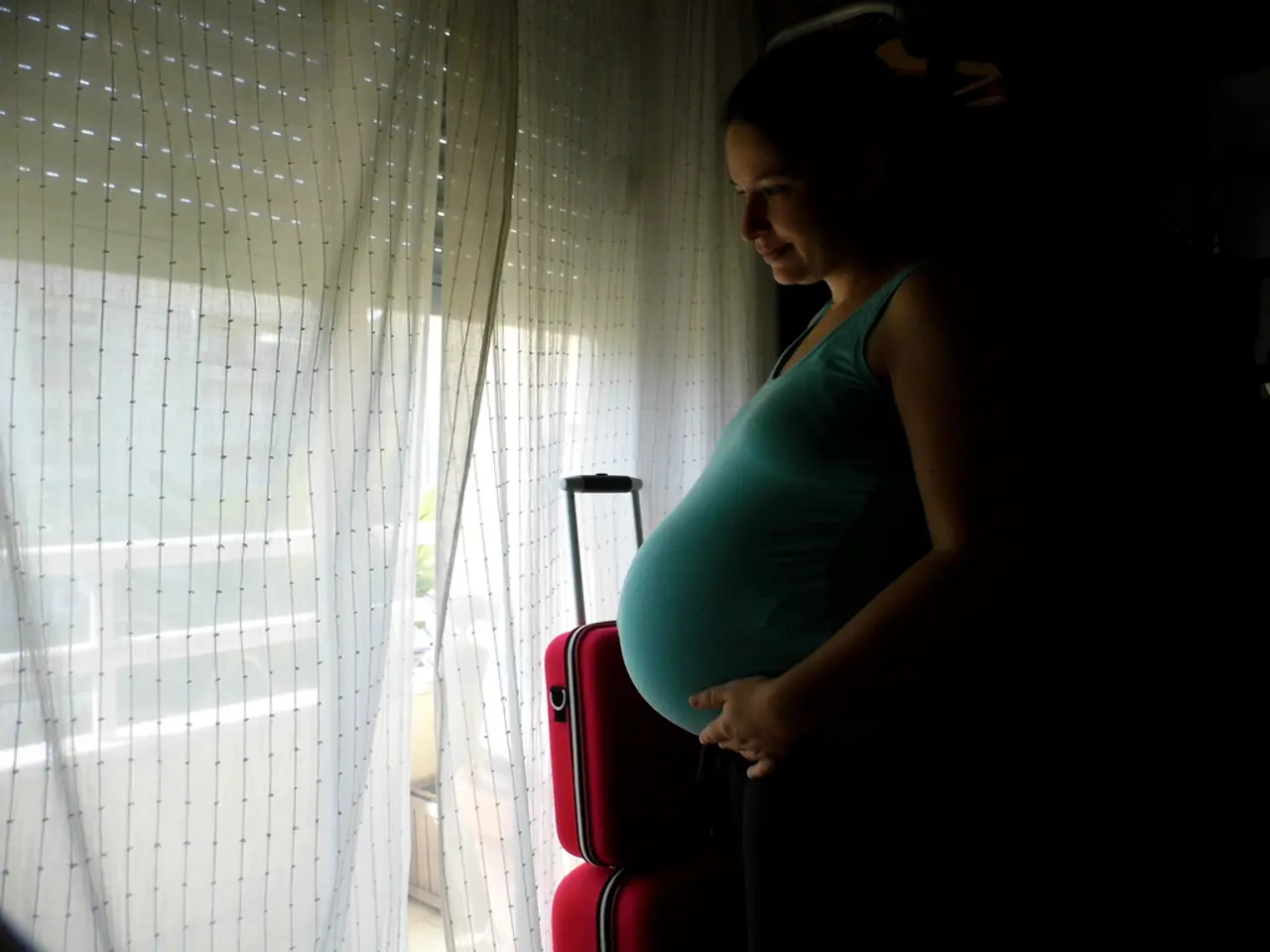Pregnancy-Related Food Poisoning: Signs, Remedies, Risks, and Further Details
Food Poisoning in Pregnancy: A Serious Concern
Pregnancy can be a wonderful time, but it also brings about increased vulnerabilities, one of which is an increased risk of food poisoning. This article aims to provide valuable information about the symptoms, prevention, and treatment of food poisoning during pregnancy.
Symptoms of Food Poisoning in Pregnancy
The common symptoms of food poisoning during pregnancy are similar to those experienced by non-pregnant individuals, including nausea, vomiting, diarrhea, fever, muscle aches, and general weakness or fatigue. Infections like listeriosis, which are particularly dangerous during pregnancy, often cause mild flu-like symptoms in the mother, such as fever, muscle aches, nausea, vomiting, and diarrhea[1][3].
Risks and Complications
Food poisoning during pregnancy can cause serious complications such as miscarriage, premature labor, stillbirth, or infection of the newborn[1][3]. Pregnant people are more vulnerable due to a naturally weakened immune system during pregnancy[5].
Prevention
Prevention focuses on avoiding foods that may carry harmful bacteria. These include raw or unpasteurized milk and dairy products, ready-to-eat deli meats, hot dogs (unless reheated until steaming hot), raw or undercooked meats, seafood (e.g., sushi), and eggs, unwashed fruits and vegetables[5]. Good food hygiene—thorough cooking, washing hands and produce, and avoiding cross-contamination—is key to reducing risk[1][3][5]. The Centers for Disease Control and Prevention (CDC) recommends the four food safety tips: clean, separate, cook, and chill[6].
Treatment
Treatment mostly involves supportive care: rest and staying well hydrated, especially if vomiting or diarrhea cause fluid loss[2][4]. Medical consultation should be sought if there is fever, severe symptoms, or known ingestion of high-risk foods, especially for potential listeriosis[3]. Listeriosis is treated with antibiotics prescribed by a healthcare provider[3][4]. Over-the-counter or prescription anti-nausea medications may relieve vomiting but should only be taken after consulting a doctor[4].
Staying Hydrated
A person with food poisoning has a high risk of developing dehydration. Replacing lost fluids can be done by drinking plain water, fruit juices diluted with water, sports drinks containing electrolytes, broths, and oral rehydration solutions or salts[7].
Ginger and Stomach Upsets
Ginger can help alleviate nausea and vomiting in a person experiencing these symptoms[8].
Gastroenteritis
Gastroenteritis is an inflammation of the intestines that can be caused by a bacterial or viral infection, and is highly contagious[9].
Important: If a pregnant person experiences any symptoms consistent with food poisoning, especially fever or muscle aches after eating susceptible foods, they should promptly contact their healthcare provider for evaluation and treatment[3]. Following food safety protocols can help pregnant people avoid food poisoning and have a safe and healthy pregnancy.
[1] Mayo Clinic. (2021). Food poisoning during pregnancy. Retrieved from https://www.mayoclinic.org/healthy-lifestyle/pregnancy-week-by-week/expert-answers/food-poisoning-during-pregnancy/faq-20058321
[2] NHS. (2021). Food poisoning. Retrieved from https://www.nhs.uk/conditions/food-poisoning/
[3] Centers for Disease Control and Prevention. (2021). Food poisoning. Retrieved from https://www.cdc.gov/foodsafety/foodborne-germs.html
[4] American Pregnancy Association. (2021). Food poisoning during pregnancy. Retrieved from https://americanpregnancy.org/healthy-pregnancy/prenatal-care-nutrition/160996/
[5] FoodSafety.gov. (2021). Pregnant women and food safety. Retrieved from https://www.foodsafety.gov/food-safety-charts/pregnant-women
[6] Centers for Disease Control and Prevention. (2021). Food safety tips. Retrieved from https://www.cdc.gov/foodsafety/food-safety-tips/index.html
[7] American Pregnancy Association. (2021). Dehydration during pregnancy. Retrieved from https://americanpregnancy.org/healthy-pregnancy/prenatal-care-nutrition/160998/
[8] National Center for Complementary and Integrative Health. (2021). Ginger. Retrieved from https://www.nccih.nih.gov/health/ginger
[9] Mayo Clinic. (2021). Gastroenteritis. Retrieved from https://www.mayoclinic.org/diseases-conditions/gastroenteritis/symptoms-causes/syc-20350251
- Pregnant individuals need to be aware of the increased risk of contracting predictive diseases like paxlovid sclerosis due to a weakened immune system.
- Avoiding blocked foods such as raw fish or undercooked meats can help in the prevention of food poisoning during pregnancy.
- With obesity being a risk factor for various diseases, maintaining a healthy lifestyle, including fitness-and-exercise and a balanced food-and-drink diet, is essential for both mother and baby.
- Ulcerative colitis, a type of inflammatory bowel disease, can trigger food poisoning symptoms and should be managed carefully during pregnancy.
- Crohns disease, another inflammatory bowel disease, can have severe complications if food poisoning occurs during pregnancy.
- Psoriasis, a skin condition, may worsen during pregnancy due to the body's changes; however, it does not directly increase the risk of food poisoning.
- Pharmaceutical companies like Pfizer are working on disease-targeting treatments for multiple health-and-wellness issues, including HIV and Alzheimers.
- The contextual information of food safety during pregnancy is crucial for pregnant individuals, as it impacts the safety and health of the unborn child.
- Depression can have an impact on a pregnant woman's food choices, potentially leading to unhealthy eating habits that could contribute to complications like diabetes.
- Drug prep, such as taking medicine for managing diseases like diabetes or high blood pressure, should be discussed with healthcare providers to ensure their safety during pregnancy.
- Asthma, an inflammatory disease of the airways, does not directly increase the risk of food poisoning during pregnancy, but managing symptoms may influence food choices.
- In the context of food poisoning prevention, retargeting advertising campaigns towards promoting good food hygiene practices could potentially reduce incidents.
- The AQ water filter, designed for removing harmful contaminants, can be beneficial in ensuring the safety of drinking water during pregnancy.
- Research in the field of science, focusing on food poisoning during pregnancy, aims to develop better diagnostic methods and treatment options to ensure a safer pregnancy experience for all.




